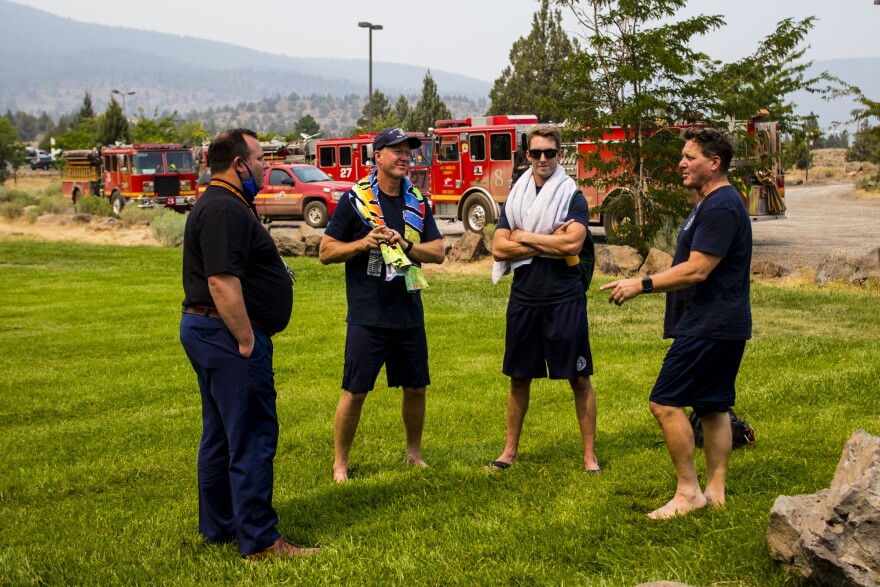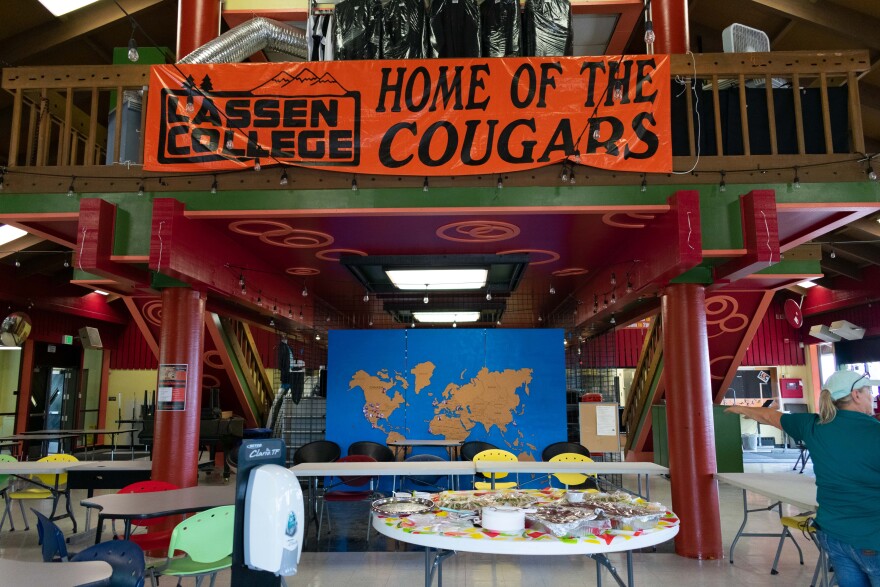Lassen Community College in Susanville served as an evacuation site for two separate wildfires last summer. Then last week, the campus opened up again for Dixie Fire evacuees. KUNR’s Lucia Starbuck spoke to the people there who help keep the site running.
As you enter campus, there’s a hand-drawn sign that reads “Students” with an arrow pointing to the left, and “Evacuees” with an arrow pointing to the right. The college opened as an evacuation center slightly over a week ago. At the administrative building, president Trevor Albertson is looking across campus.
“Normally, you’d have a great view from here of the Sierras meeting the Cascade Mountains. Today, you’ve got a smokey view,” Albertson said.
The smoke is coming from the nearby Dixie Fire, and it’s also bringing ash. There are black speckles scattered across the ground. On campus, the lawn is yellowing because the sprinklers are turned off, so they don’t spray evacuees sleeping outside.
“Down to the south end of campus, you’re gonna see a lot of tents, a lot of RVs in the parking lot, fifth wheels,” Albertson said.

Susanville is an evacuation hub for the Dixie Fire. Located in northerneastern California, the mountain town has 15,000 residents and is the largest population center in the area. The American Red Cross is helping run the evacuation center at the college, along with Lassen High School. On Thursday night, nearly 280 evacuees in total checked in.
“If we’re not here to do this, especially in this community, where we’re small, rural, and kind of far away from help, nobody’s going to pick up that extra work. We’ve gotta handle it here and we’re gonna handle it,” Albertson said.
The American Red Cross is caring for elderly evacuees in the school’s gym, and there are shower and laundry facilities. Salvation Army volunteers are working side by side with the college’s kitchen staff to prepare hot meals in the school’s cafeteria. Emergency Disaster Services volunteer Mary Krebs is wearing a red apron and is busy chopping mushrooms.
“We’re making salad, and we’re using mushrooms, tomatoes and two different kinds of lettuce, and cauliflower,” Krebs said.
Krebs is retired and felt compelled to volunteer after the Camp Fire in 2018, which killed 85 people and destroyed the town of Paradise.

“I sat home, crying, watching it, feeling helpless that I couldn’t do anything, so I joined that year,” Krebs said.
Now, Krebs volunteers her time in the kitchen from 7 in the morning until 7 at night. She preps and makes meals, along with sterilizing the kitchen. For dinner, Krebs is cooking up steaks for firefighters. There are dozens sleeping on campus.
“We are here because there are no hotel rooms because everybody’s evacuated,” Dave Gillotte said.
Gillotte is the Los Angeles County Fire Department fire captain and the Los Angeles County Firefighters IAFF Local 1014 union president. Gillotte and his crew are assigned 16-day trips, with 24 hours on, and 24 hours off. They’re sleeping on the floor of the academic building that gets the darkest and has the best AC.
“All my firefighters are looking at things on the walls, periodic tables, science experiments, and you know, it looks like a bunch of firefighters with ice cream headaches, but I’ll tell you what, it’s air conditioned, we’re sleeping on the floor in the math and science room, and maybe we’re getting a little education along the way,” Gillotte said.

The thirty-five-year firefighting veteran said it’s been humbling to sleep in the same location where evacuees are staying.
“It becomes real. The very people whose property we’re protecting are here on the same campus with us, and so that brings it right home as if it was us,” Gillotte said.
Along with firefighters, volunteers, and evacuees, there are also students on campus for orientation. Lassen Community College president Albertson said he’s preparing to welcome about 1,500 full-time students on Monday, and he plans on keeping the evacuation site running.
“We will stay open until the county tells us they don’t need us anymore,” Albertson said.
Albertson said many of their students go into careers of service, so he’s not surprised the campus has stepped up to help, as it’s part of the school’s culture.
Lucia Starbuck is a corps member with Report for America, an initiative of the GroundTruth Project.
Photojournalist Ty O’Neil contributed to this story.





